This article was co-authored by Chris M. Matsko, MD. Dr. Chris M. Matsko is a retired physician based in Pittsburgh, Pennsylvania. With over 25 years of medical research experience, Dr. Matsko was awarded the Pittsburgh Cornell University Leadership Award for Excellence. He holds a BS in Nutritional Science from Cornell University and an MD from the Temple University School of Medicine in 2007. Dr. Matsko earned a Research Writing Certification from the American Medical Writers Association (AMWA) in 2016 and a Medical Writing & Editing Certification from the University of Chicago in 2017.
There are 10 references cited in this article, which can be found at the bottom of the page.
This article has been viewed 28,672 times.
Testicular cancer is cancer that affects the testicles in males, and usually this cancer afflicts younger men between the ages of 25 and 30.[1] This cancer is often curable through proper treatment. Treatment options include surgery, radiation therapy, and chemotherapy. If you have been diagnosed with testicular cancer, learn how to treat the stage of the cancer that is affecting you.
Steps
Evaluating the Type of Cancer
-
1Have the tumor surgically removed. Biopsies for testicular cancer are rarely done because biopsies for this particular cancer increase the risk of the cancer spreading. If a tumor is detected via a clinical diagnosis, ultrasound, and blood tests, then the doctor will remove the tumor in a process called a radical inguinal orchiectomy.[2]
- In addition to the tumor, the testicle and spermatic cord will also be removed. If you remove the entire testicle, you have the option of getting a testicular implant.[3]
- The tumor and other tissue is then sent to a lab to be examined for cancerous cells.
-
2Get imaging tests. If the analysis of the tumor shows that there are cancerous cells, then your doctor will order imaging tests, such as an ultrasound (to check for fluid or for a solid mass), x-rays, MRIs, CT, PET, or bone scans. The doctor will need images of your body to determine certain important things about your cancer.[4]
- Imaging tests will be used to determine if and where the cancer has spread. These tests can help the doctor detect if the cancer has spread to other areas, like the lymph nodes or other organs. A CT scan is recommended if there is suspected metastatic spread to the pelvis and thorax.
- Imaging tests are also used to see if the treatment is working and if the cancer is returning after treatment.
Advertisement -
3Determine the stage of the cancer. Testicular cancer is divided in stages. The stage of the cancer refers to the severity of the cancer. The stage is determined from the examination of the tumor, where the cancer cells are studies in a lab. Your treatment depends on the stage of cancer, so you will always get your cancer staged when you get diagnosed.[5]
- Stage 0 testicular cancer occurs when abnormal cells are found in the testicles. The cells may evolve into cancer, but at this stage they are just abnormal. This may be something like a testicular scar.
- Stage I cancer is discovered after the testicle(s) is removed. Stage I cancer occurs when the cancer is either in the testicle or the membranes around the testicle. Stage I may also be in the spermatic cord or scrotum. Surgery and close monitoring may be all the treatment that is needed for stage I. Sometimes, chemotherapy or radiation is also used.
- Stage II cancer is when the cancer is in the testicle, scrotum, and spermatic cord, along with the lymph nodes in the abdomen. Stage II often is treated with radiation therapy. Sometimes, mild chemotherapy is also used.
- Stage III cancer has the same markers as stage II but has also spread to lymph nodes beyond the abdomen, to the lungs, or other parts of the body. Surgery is often needed to remove tumors in other parts of the body, along with chemotherapy.[6] Chemotherapy may involve cisplatin based combination therapy with three cycles of bleomycin, etoposide, and cisplatin. However, men with compromised pulmonary function have to be careful if they are on bleomycin because this chemotherapy can cause lung injury.
-
4Develop your treatment team. You will work with a treatment team when you undergo treatment for testicular cancer. Your team will vary depending on what the stage of your cancer is and your options for treating that stage.[7]
- You will probably have a urologist, physician assistant, nurses, and nurse practitioners.
- If you have radiation therapy, you will have a radiation oncologist. If you undergo chemotherapy, you will have a medical oncologist.
- You may also have social workers or other mental health professionals, physical therapists, or other professionals.
Seeking Medical Treatment
-
1Choose an NIH recognized cancer treatment center. When deciding where to undergo treatment, make sure you choose a place that actively treats testicular cancer. Some hospitals or treatment centers may specialize in other types of cancer, such as breast cancer, lung cancer, or colon cancer. However, any National Institutes of Health (NIH) recognized cancer treatment center will provide excellent treatment, so making this distinction is important. These treatment centers are known as NCIs, or National Cancer Institutes.[8]
- There are 69 NIH NCI-Designated Cancer Centers across the country. These are the best places to go for cancer treatment. These institutions usually do clinical and basic science research, and they have an academic approach highly focused on the treatment of all types of cancer.
-
2Use careful observation. One common treatment for cancer that is not found in any place in the body except the testicle is careful observation. After surgery removes the testicle, you may need no other treatment. For the next decade, you will have regular check ups to monitor your body to make sure the cancer has not returned.[9]
- You will get exams and blood tests every three to six months for a year after your surgery, then every six to nine months. You will also have CT scans and x-rays to check for cancers in other parts of your body.
- Radiation and chemotherapy will be used if cancer cells are found in other parts of your body.
-
3Get radiation therapy. Radiation therapy is a common cancer treatment for stage II cancer. During radiation therapy, high-powered x-rays and other radiation are used to stop the growth and kill cancer cells. Radiation therapy is most commonly used to destroy cancer cells in the lymph nodes.[10]
- Radiation is done externally by placing the machine over the affected area. Radiation therapy is painless.
- Radiation is sometimes used with early stage II cancers to kill any cancer cells that may be developing in the lymph nodes.
- Radiation is used in stage III when the cancer has spread metastatically to other parts of the body.
-
4Undergo chemotherapy. Chemotherapy is a drug treatment for testicular cancer that is generally injected directly into the vein with a needle. The injected drug travels through the body to get to the cancer cells. This treatment finds and kills cancer cells not attached to the tumor that are floating through your body.[11]
- Chemotherapy is generally used with stage I, II, or III cancer when the cancer has moved beyond the testicle. If the cancer is only in the testicle, chemotherapy will not be used. Chemotherapy is also used when the cancer is recurrent.
- Chemotherapy, usually a cisplatin based therapy, is administered in cycles of treatment and rest. The treatment may take weeks or months to complete.
-
5Remove the lymph nodes in your abdomen. If you have some types of stage I or II cancer, you will need to have the lymph nodes in your abdomen removed. This is done in a process called a retroperitoneal lymph node dissection (RPLND). The surgery is done via an incision in the abdominal region, and the lymph nodes are removed from the back of the abdomen.[12]
- Removing the lymph nodes may cause damage to nearby nerves, which can lead to problems with ejaculation.[13]
-
6Undergo related surgeries. If you have certain types of advanced stage testicular cancer, the cancer may have moved to other parts of the body. You may need to get surgery on other parts of your body if chemotherapy or radiation has not killed the cancer cells.[14]
- For example, you may have to get tumors removed in your lungs, brain, liver, or other organs.
Considering Other Options
-
1Get a second opinion. If you do not have life-threatening cancer, you may consider getting a second opinion. A second opinion can help you feel confident that your cancer diagnosis is correct. A second opinion can also help give you an idea of common treatment options.[15]
- Don’t feel like you can’t get a second opinion just because a doctor told you that you had cancer. Your health and treatment is in your hands, and you have a say. If you don’t feel comfortable with a treatment option or diagnosis, get a second opinion.
-
2Look into sperm banking. If you have testicular cancer but still want to be able to have children, you may consider sperm banking. Testicular cancer does not mean you will be infertile; however, changes due to the cancer, chemotherapy, or surgery may cause low sperm counts, ejaculation problems, or infertility.[16]
- Sperm banking is where you freeze samples of your sperm so your partner can be impregnated via artificial insemination later.
- Advanced stages of testicular cancer are always offered sperm banking.
-
3Get testosterone replacement therapy. You may need testosterone replacement therapy if you have had one or both testicles removed. You may be given testosterone as an injection, patch, or gel. Testosterone replacement therapy can help increase your libido and help you with erectile problems.[17]
- Low levels of testosterone may cause fatigue, lower sex drive, reduced growth of body hair, erectile dysfunction, and weight gain.
- Side effects of TRT are mild. You may experience acne or oily skin, swollen breasts, and increased need to urinate. TRT may increase the risk of prostate cancer, so discuss this with your doctor.
-
4Treat retrograde ejaculation. If the cancer spreads to or damages your lymph nodes, you may experience retrograde ejaculation. This is a condition where the damaged lymph nodes make the semen you ejaculate travel back into your body, into the bladder. You can orgasm, but you cannot impregnate a partner.[18]
- To treat retrograde ejaculation, you can take medicine to strengthen the bladder to help keep the semen from flowing into it.
- You can also impregnate your partner with by artificial insemination or in-vitro fertilization.
-
5Consider a clinical trial. You may decide to do a research clinical trial as part of your cancer treatment. Many cancer treatments offer the newest advanced cancer treatments, and often they are a way to get the newest treatments that aren’t available to the general public yet.[19]
- Clinical trials help doctors and researchers learn new and better ways to treat cancer.
- Ask your doctor if the treatment center or hospital does clinical trials. You can also look online for clinical trials run by cancer organizations and cancer research hospitals.
- Clinical trials may not be right for everyone. Talk to your doctor.
References
- ↑ https://www.urologyhealth.org/urology-a-z/t/testicular-cancer
- ↑ https://my.clevelandclinic.org/health/diseases/12183-testicular-cancer
- ↑ https://my.clevelandclinic.org/health/diseases/12183-testicular-cancer
- ↑ https://my.clevelandclinic.org/health/diseases/12183-testicular-cancer
- ↑ http://www.cancer.gov/types/testicular/patient/testicular-treatment-pdq#section/_26
- ↑ http://www.nhs.uk/Conditions/Cancer-of-the-testicle/Pages/Treatment.aspx
- ↑ http://www.cancer.org/cancer/testicularcancer/detailedguide/testicular-cancer-treating-general-treatment-info
- ↑ https://www.cancer.gov/research/nci-role/cancer-centers
- ↑ https://my.clevelandclinic.org/health/diseases/12183-testicular-cancer
- ↑ https://my.clevelandclinic.org/health/diseases/12183-testicular-cancer
- ↑ http://www.cancer.org/cancer/testicularcancer/detailedguide/testicular-cancer-treating-chemotherapy
- ↑ http://www.cancer.org/cancer/testicularcancer/detailedguide/testicular-cancer-treating-by-stage
- ↑ http://www.mayoclinic.org/diseases-conditions/testicular-cancer/basics/treatment/con-20043068
- ↑ http://www.nhs.uk/Conditions/Cancer-of-the-testicle/Pages/Treatment.aspx
- ↑ https://www.cancer.org/treatment/finding-and-paying-for-treatment/choosing-your-treatment-team/seeking-a-second-opinion.html
- ↑ http://www.nhs.uk/Conditions/Cancer-of-the-testicle/Pages/Treatment.aspx
- ↑ http://www.nhs.uk/Conditions/Cancer-of-the-testicle/Pages/Treatment.aspx
- ↑ http://www.nhs.uk/Conditions/Cancer-of-the-testicle/Pages/Treatment.aspx
- ↑ http://www.cancer.org/cancer/testicularcancer/detailedguide/testicular-cancer-treating-general-treatment-info


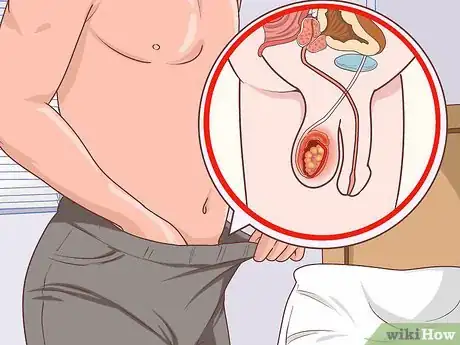
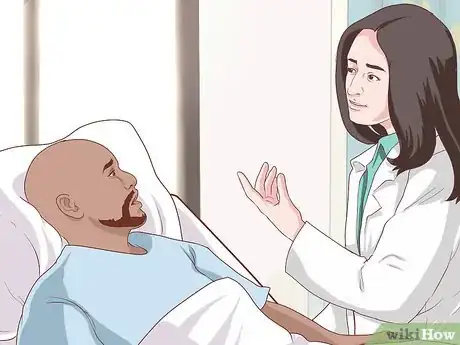
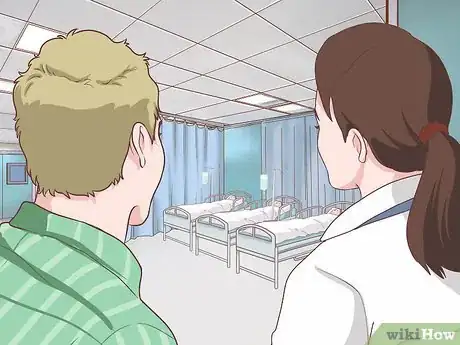


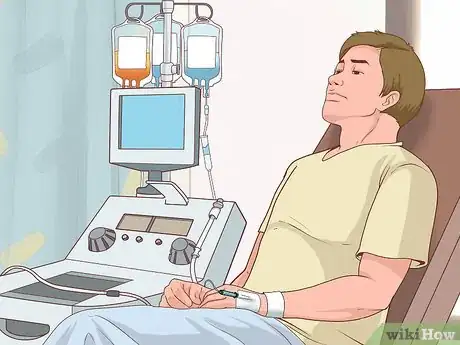


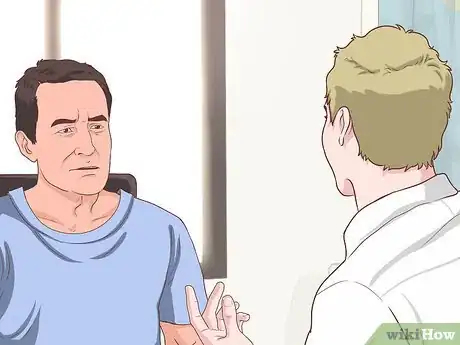
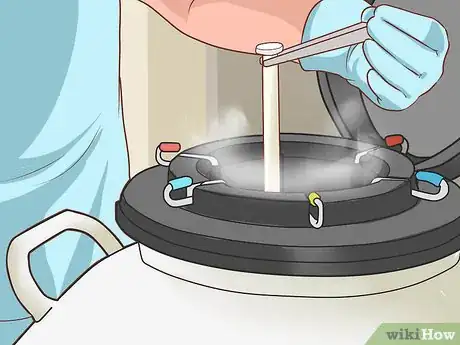




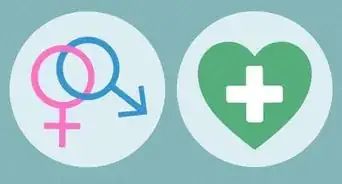
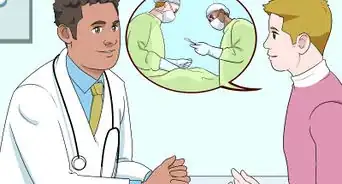
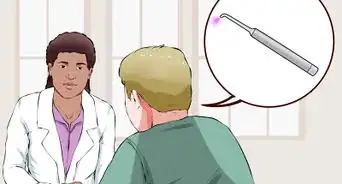


-Step-13.webp)

-Step-8-Version-3.webp)

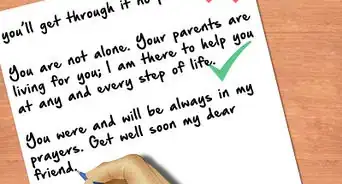
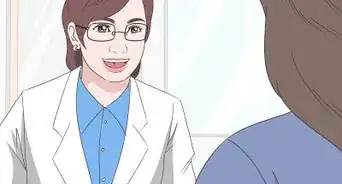

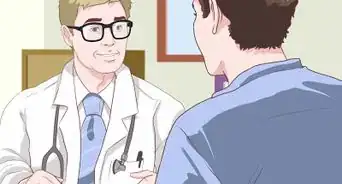







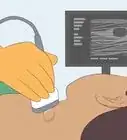
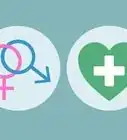
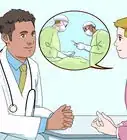
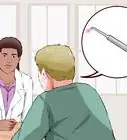



































Medical Disclaimer
The content of this article is not intended to be a substitute for professional medical advice, examination, diagnosis, or treatment. You should always contact your doctor or other qualified healthcare professional before starting, changing, or stopping any kind of health treatment.
Read More...